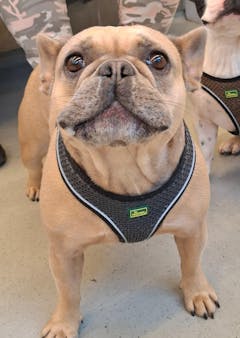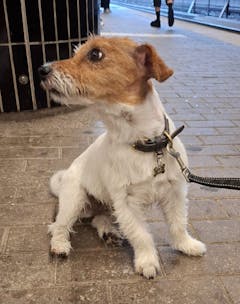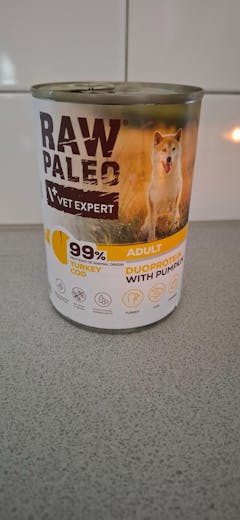Tandkräm & Munskölj
Tandkräm & Munskölj för Hund: Nyckeln till Frisk Munhälsa och Bättre Livskvalitet
På ZooStar.se vet vi att din hunds leende är lika viktigt som ditt eget! En frisk mun är inte bara trevligt för husse och matte (hejdå, dålig andedräkt!), utan är också en grundläggande pelare för din hunds **allmänhälsa** och välbefinnande. Tyvärr är **tandproblem hos hund** mycket vanligt, med upp till 80% av hundar över tre års ålder som lider av någon form av tandsjukdom. Problemen börjar oftast med plack som utvecklas till **tandsten hund**, vilket i sin tur kan leda till inflammation i tandköttet (gingivit) och i värsta fall **tandlossning hund** (parodontit).
Den goda nyheten är att de flesta **tandproblem hos hund** kan förebyggas med regelbunden och konsekvent **munvård hund**. I denna omfattande guide kommer vi att dyka djupt ner i vikten av god **tandvård hund**, hur du effektivt kan använda **tandkräm hund** och **munskölj hund**, samt presentera Zoostars noga utvalda sortiment av produkter för att hålla din hunds mun ren och frisk. Låt oss tillsammans ge din hund ett liv med friska tänder och ett strålande leende!
Varför är Munvård så Viktigt för Din Hund?
**Munhälsa** är mer än bara fräsch andedräkt. Det är en avgörande del av din hunds **allmänhälsa**. Här är varför det är så viktigt att prioritera **tandvård hund**:
Vanliga Munproblem hos Hundar:
- Plack och Tandsten: Plack är en tunn, klibbig film av bakterier som ständigt bildas på tänderna. Om den inte avlägsnas, mineraliseras den och blir till hård **tandsten hund**. Tandsten är porös och drar lätt till sig mer plack, vilket skapar en ond cirkel.
- Dålig Andedräkt (Halitos): Ofta det första tecknet på att något är fel i munnen, orsakad av bakterier.
- Gingivit (Tandköttsinflammation): Tandsten och plack irriterar tandköttet, vilket leder till inflammation, rodnad, svullnad och blödning. Detta är reversibelt om det behandlas i tid.
- Parodontit (Tandlossning): Om gingivit lämnas obehandlad, sprider sig inflammationen till de djupare vävnaderna runt tanden (ben, ligament). Detta leder till nedbrytning av benet och kan resultera i att tanden blir lös och till slut faller ut. Detta är irreversibelt och mycket smärtsamt.
- Smärta och Svårigheter att Äta: Svår parodontit kan orsaka intensiv smärta, vilket gör att hunden undviker att äta eller tugga på vissa sidor av munnen.
- Systemiska Hälsoeffekter: Bakterier från munnen kan via blodbanan spridas till andra organ som hjärta, njurar och lever, vilket kan leda till allvarliga systemiska sjukdomar. Munhälsa är direkt kopplad till **hundens allmänhälsa**.
Förebyggande är Nyckeln:
Att förebygga problem är alltid bättre och billigare än att behandla dem. Regelbunden borstning med **tandkräm hund** och användning av **munskölj hund** är de mest effektiva metoderna för att hålla plack och tandsten borta och därmed undvika smärtsamma och kostsamma veterinärbesök för professionell tandrengöring under narkos.
Tandkräm & Munskölj: Dina Bästa Vänner i Munvården
På Zoostar.se hittar du en rad specialanpassade produkter för hundens munhälsa. Det är viktigt att aldrig använda vanlig mänsklig tandkräm eller munskölj till din hund, då dessa innehåller ämnen som kan vara skadliga för hundar (t.ex. fluorid och xylitol).
1. Tandkräm för Hund: Effektiv Rengöring och Fräsch Andedräkt
**Tandkräm hund** är utformad för att vara säker att svälja och kommer ofta i smaker som tilltalar hundar (t.ex. köttsmak) för att göra borstningen mer behaglig. Huvudsyftet med tandkrämen är att underlätta den mekaniska rengöringen från tandborsten och att innehålla enzymer eller andra aktiva ingredienser som motverkar plack och bakterier.
- Enzymer: Många hundtandkrämer innehåller enzymer som glukosoxidas eller laktoperoxidas, vilka hjälper till att bryta ner plack och motverka tillväxten av bakterier i munnen.
- Milda slipmedel: Dessa hjälper till att skrubba bort plack utan att skada emaljen.
- Smak: Att tandkrämen smakar gott är avgörande för att hunden ska acceptera borstningen.
Den mest effektiva metoden att använda **tandkräm hund** är genom daglig borstning med en tandborste anpassad för hundar (fingerborste eller vanlig hundtandborste).
2. Munskölj för Hund: Komplement för Extra Skydd
**Munskölj hund** är ett utmärkt komplement till tandborstning, särskilt för hundar som inte accepterar borstning dagligen, eller för att ge extra skydd mot bakterier och dålig andedräkt. Munskölj kan antingen sprayas direkt i munnen eller tillsättas i hundens dricksvatten.
- Enzymatiska lösningar: Innehåller liknande enzymer som tandkräm för att bryta ner plack och bakterier.
- Antiseptiska ingredienser: Vissa munskölj innehåller ämnen som klorhexidin (används kortare perioder) eller zinkglukonat som motverkar bakterietillväxt och minskar dålig andedräkt.
- Smakförbättrande: Bidrar till fräschare andedräkt.
Att använda **munskölj hund** i dricksvattnet är ett passivt sätt att bidra till munhälsan, men ersätter inte den mekaniska rengöringen från borstning.
Kompletterande Munvårdsprodukter från Zoostar.se
Förutom **tandkräm hund** och **munskölj hund** erbjuder Zoostar.se en rad andra produkter som kompletterar den dagliga munvården och bidrar till en friskare mun:
1. Dental Tuggben och Tugg: Mekanisk Rengöring
Dental tugg och tuggben är utformade för att, genom sin form och konsistens, skrubba tänderna och minska plack och tandsten när hunden tuggar. De kan vara ett bra komplement, men ersätter inte tandborstning. Välj tugg som är anpassade för din hunds storlek och tuggförmåga.
2. Pulver och Strössel: Enkelt att Dosera
Det finns även pulver och strössel som kan blandas i hundens mat eller strös över fodret. Dessa innehåller ofta alger (som Ascophyllum Nodosum) eller enzymer som arbetar systemiskt via saliven för att minska plackbildning och tandsten. Dessa är enkla att använda för hundägare som har svårt att borsta tänderna på sin hund.
3. Tandborstar för Hund: Anpassade för Optimal Rengöring
En bra tandborste är avgörande. Välj en tandborste som är anpassad för hundar, antingen en fingertandborste som du trär på fingret, eller en traditionell hundtandborste med vinklat huvud och mjuka borst. Storleken på borsthuvudet ska passa din hunds mun.
Så Borstar Du Tänderna på Din Hund: En Steg-för-Steg Guide
Regelbunden tandborstning är den mest effektiva metoden för att förebygga **tandsten hund** och andra munproblem. Det är bäst att börja när hunden är ung, men även äldre hundar kan lära sig att acceptera det med tålamod och positiv förstärkning.
Steg-för-Steg till Lyckad Tandborstning:
- Börja långsamt: Låt hunden vänja sig vid beröring i munnen. Börja med att bara röra vid nosen och lyfta läpparna. Beröm och ge belöning.
- Introducera tandkrämen: Låt hunden smaka på **tandkräm hund** för att vänja sig vid smaken. Vissa tandkrämer kan hunden få slicka direkt från tuben.
- Introducera tandborsten: När hunden accepterar tandkrämen, applicera en liten mängd på en fingertandborste eller en vanlig hundtandborste. Börja borsta bara en liten del av tänderna, kanske bara hörntänderna och kindtänderna.
- Fokusera på utsidan: Plack och tandsten bildas oftast på tändernas utsida, närmast kinden. Därför är det viktigast att fokusera på dessa ytor. Du behöver sällan borsta insidan av tänderna då hundens tunga naturligt rengör dem till viss del.
- Korta, mjuka drag: Använd korta, cirkulära rörelser längs tandköttskanten och tänderna.
- Frekvens: Idealiskt är att borsta tänderna varje dag. Varannan dag är också bra, men mindre frekvens än så ger sämre effekt.
- Belöna: Avsluta alltid med beröm, lek eller en godbit för att skapa en positiv association till tandborstning.
Var tålmodig! Det kan ta tid att vänja hunden vid borstning, men det är en investering i dess långsiktiga hälsa.
Munvård som en Del av Hundens Totala Hälsa på Zoostar.se
På Zoostar.se ser vi **munvård** som en kritisk del av din hunds **totala hälsa**. Problem i munnen kan påverka hela kroppen, och därför är våra produkter för **tandkräm & munskölj** tätt sammankopplade med andra viktiga kategorier i vårt sortiment:
- Hundprodukter: Den övergripande kategorin där allt för din hunds välbefinnande finns, inklusive en stark grund av munvård.
- Hundens Apotek: Här hittar du alla hälsorelaterade produkter. En frisk mun förebygger många sjukdomar och minskar behovet av besök på "hundens apotek".
- Munvård: Den bredare kategorin som omfattar alla aspekter av munhälsa, där **tandkräm & munskölj** är centrala.
- Dental Tugg: En perfekt komplettering till borstningen, som hjälper till att hålla tänderna rena mekaniskt mellan borstningarna.
- Kosttillskott & Hälsa och Kosttillskott för Hundar: Vissa näringsämnen och antioxidanter kan stödja tandköttshälsan och bidra till att minska inflammation i munnen, vilket är viktigt för att förebygga **tandlossning hund**.
- Mage & Matsmältning: Dålig munhälsa med bakterier kan påverka hundens matsmältningssystem. Dessutom kan vissa magproblem bidra till dålig andedräkt. En frisk mun stöder en frisk mage.
- Immunförsvar & Allmänt Stöd: Kronisk inflammation i munnen belastar **immunförsvaret**. Genom god **munvård** avlastar du immunsystemet och bidrar till en starkare allmänhälsa.
- Lugnande till Hund: Att borsta tänderna kan vara stressande för vissa hundar. Med tålamod, positiv förstärkning och kanske även hjälp av **lugnande medel** kan tandborstningen bli en mer behaglig upplevelse.
- Rörelseapparaten: Smärta i munnen kan påverka hur hunden äter och tuggar, vilket kan ha en indirekt effekt på muskler och leder på grund av felaktig belastning.
- Hud & Päls: Även om det inte är en direkt koppling, visar en hund med god allmänhälsa och näringsstatus ofta en frisk hud och päls.
Genom att investera i produkter för **tandkräm & munskölj** och aktivt arbeta med din hunds **munhälsa**, bidrar du till dess övergripande välbefinnande. En frisk mun är lika viktig som en frisk kropp! Utforska Zoostars sortiment idag och ge din bästa vän grunden för ett friskt och lyckligt liv!
Vanliga Frågor om Tandkräm & Munskölj för Hund (FAQ)
Hur ofta ska jag borsta min hunds tänder?
För optimal effekt bör du borsta din hunds tänder **varje dag**. Plack bildas kontinuerligt, och det tar bara cirka 24-48 timmar för plack att mineraliseras till **tandsten hund**, som inte kan borstas bort. Om daglig borstning inte är möjlig, försök borsta minst varannan dag. Även några gånger i veckan är bättre än inget alls, men ju oftare desto bättre.
Kan jag använda min egen tandkräm till min hund?
Nej, **använd aldrig mänsklig tandkräm till din hund**. Mänsklig tandkräm innehåller ingredienser som fluorid och xylitol (en konstgjord sötningsmedel) som är giftiga för hundar om de sväljs. Hundar sväljer tandkrämen, till skillnad från människor som spottar ut den. Använd alltid en **tandkräm hund** som är speciellt framtagen för hundar, den är säker att svälja och kommer ofta i smaker som tilltalar hundar.
Min hund hatar att få tänderna borstade. Finns det alternativ?
Ja, även om tandborstning är mest effektivt, finns det alternativ och komplement om din hund inte accepterar borstning:
- **Munskölj hund:** Som tillsätts i dricksvattnet eller sprayas direkt i munnen.
- Dental tugg och tuggben: Dessa kan hjälpa till med den mekaniska rengöringen.
- **Pulver/strössel:** Produkter som blandas i maten och arbetar via saliven för att minska plack.
- **Professionell tandrengöring:** Regelbundna veterinärbesök för rengöring under narkos kan vara nödvändigt om hemvården är otillräcklig.
Hur vet jag vilken tandkräm och munskölj som är bäst för min hund?
Valet av **tandkräm hund** och **munskölj hund** beror på din hunds preferenser och behov. Leta efter produkter som är:
- **Veterinärrekommenderade:** Många veterinärer rekommenderar specifika märken.
- **Enzymatiska:** Enzymatiska tandkrämer och munskölj är mycket effektiva mot plack.
- **Smakliga:** En god smak ökar acceptansen hos hunden.
- **Säkra att svälja:** Alla hundspecifika tandkrämer och munskölj ska vara säkra att svälja.
Kan dålig andedräkt alltid kopplas till tandproblem?
Oftast, ja. **Dålig andedräkt hund** (halitos) är nästan alltid ett tecken på bakteriell tillväxt i munnen, vilket indikerar plack, **tandsten hund**, gingivit eller parodontit. I sällsynta fall kan dålig andedräkt också vara ett symtom på underliggande systemiska sjukdomar, såsom njur- eller leversjukdomar, diabetes eller problem i matsmältningssystemet. Om munvården inte förbättrar andedräkten, eller om din hund visar andra symtom, bör du kontakta din veterinär.
När ska jag kontakta veterinären gällande min hunds tänder?
Kontakta veterinären om du märker något av följande:
- **Kraftig dålig andedräkt** som inte förbättras med hemvård.
- Synlig **tandsten** (gul-bruna beläggningar) på tänderna.
- **Rött, svullet eller blödande tandkött.**
- Lösa eller saknade tänder.
- Svårigheter att äta, tugga eller dregla ovanligt mycket.
- Hund som gnuggar munnen med tassen eller verkar ha ont i munnen.
- Förändringar i ätbeteende eller ovilja att tugga på leksaker/ben.
Hur kan dental tugg komplettera tandkräm och munskölj?
Dental tugg är ett utmärkt komplement eftersom de bidrar till mekanisk rengöring när hunden tuggar. De är utformade med speciella former och texturer som hjälper till att skrapa bort plack från tändernas yta. De kan inte ersätta den grundliga rengöring som borstning med **tandkräm hund** ger, men de kan minska plackuppbyggnaden mellan borstningarna och bidra till att bibehålla fräschare andedräkt. Kombinera dem med daglig borstning och eventuell **munskölj hund** för bästa möjliga **munvård hund**.
Husdjursprodukter Online
Utforska fler populära hundkategorier
Här hittar du många av våra mest efterfrågade kategorier – från hundfoder och godis till tillbehör, vård och aktivering.
Ledande Fodertillverkare
Populära hundfodermärken
Här hittar du våra mest populära hundfoder – från spannmålsfritt till veterinärfoder. Klicka på ett varumärke för att se hela sortimentet.






